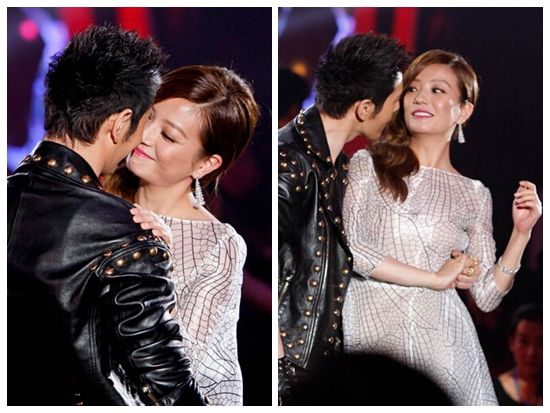
The Golden Rooster Hundred Flower Film Festival opened last weekend in Lanzhou China and this year the popular vote Hundred Flower Awards was up for grabs. It’s been yet another blockbuster year in Chinese entertainment with quite a few box office successes to crow about (har har). While the Golden Rooster Awards is the industry vote akin to the Oscars, the Hundred Flower Awards is the popular vote Golden Globes where fan favorites actually can walk home with prizes. The biggest upset of the night was Vicky Zhao Wei winning Best Director for her directorial debut film So Young starring Mark Chao and Han Geng, defeating director Wong Kar Wei and his masterpiece The Grandmaster. That movie didn’t go home empty handed as The Grandmaster won Best Picture and along with it leading lady Zhang Zi Yi took home Best Actress for the second time in a row.. Best Actor went to Zhao Wei’s real life college classmate BFF Huang Xiaoming won Best Actor for director Peter Chan‘s movie American Dreams in China.
The entertainment highlight of the night was Huang Xiaoming and Zhao Wei’s two decades long close friendship that has withstood her getting married and having a baby and him having a very steady girlfriend of his own. They arrived together to the ceremony and it was a rainy walk down the red carpet and ever the gentleman Huang Xiaoming carried the umbrella for his lady bestie the entire way. Huang Xiaoming performed a song during the show and pulled Zhao Wei in with a sultry dance followed by a for the camera smooch that caught her off guard but she gamely went along with it with her usual carefree charm. After the ceremony as the winners met the press backstage, Zhao Wei and Huang Xiaoming did their interview together. He followed behind as she walked on the stage first and then fixed the train of her dress, and at this point I’m sure a the female popular of China’s 1.3 billion people were screaming “Why don’t I have a drop-dead gorgeous male bestie like him in my life!”
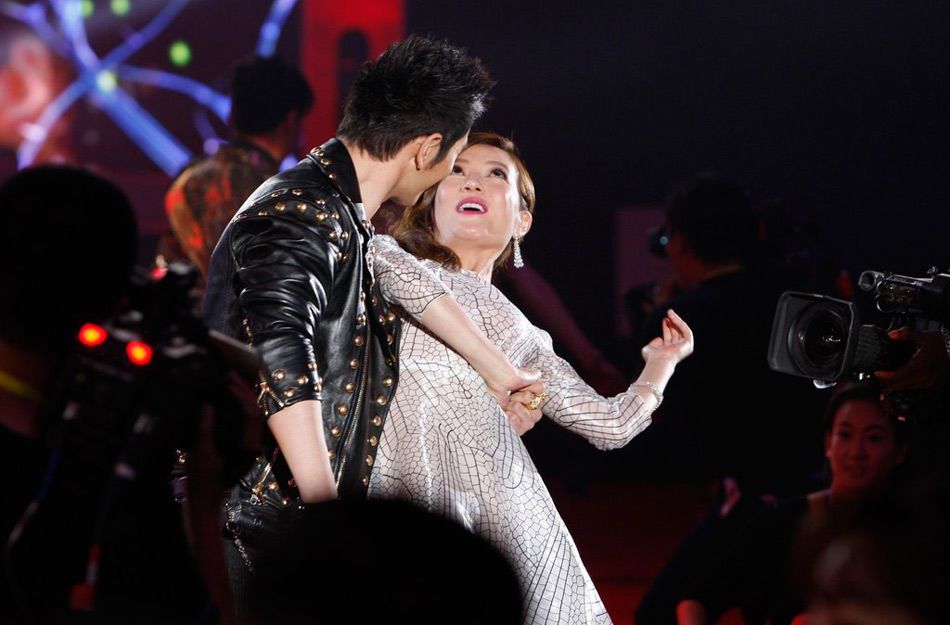

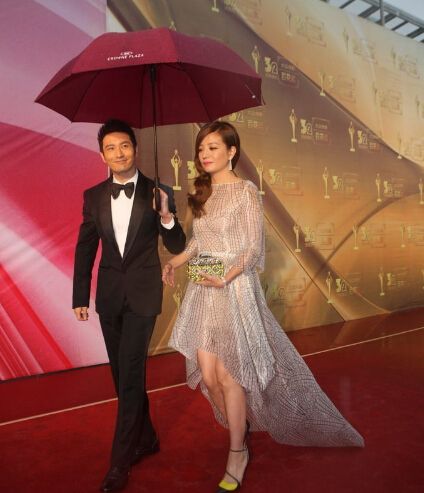
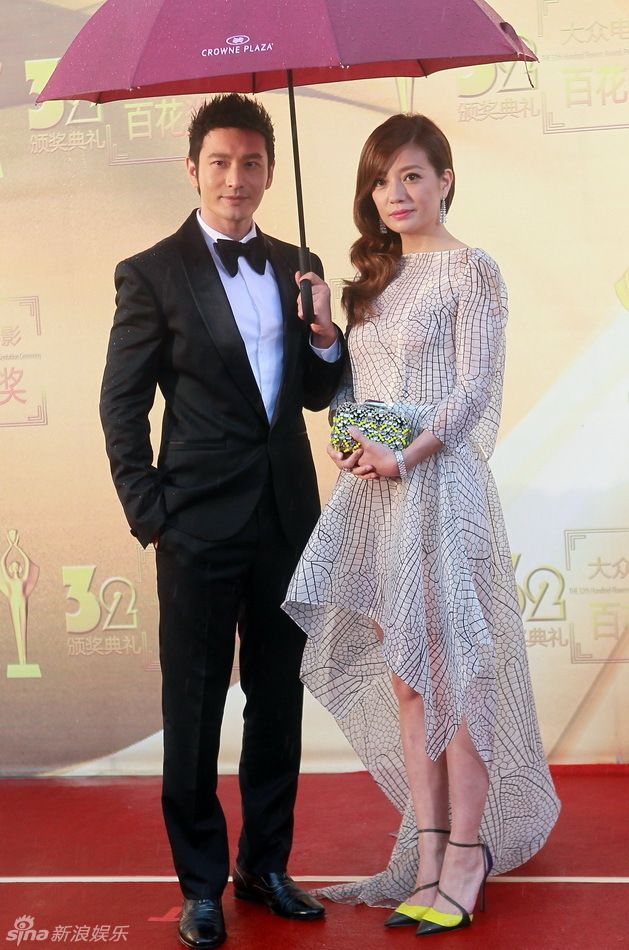
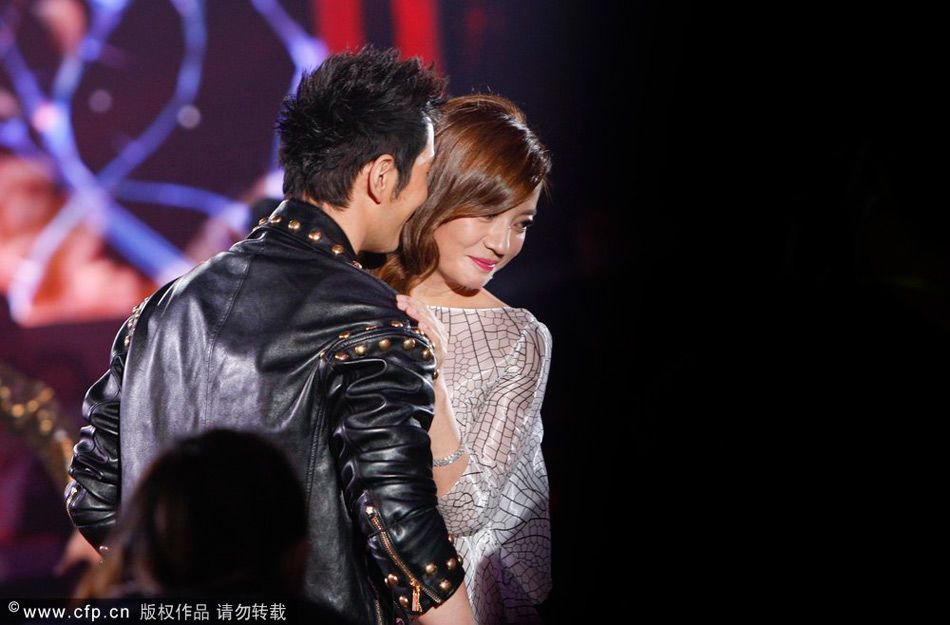
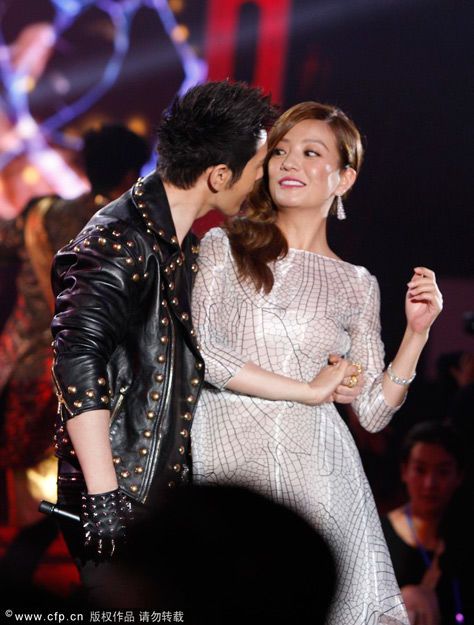
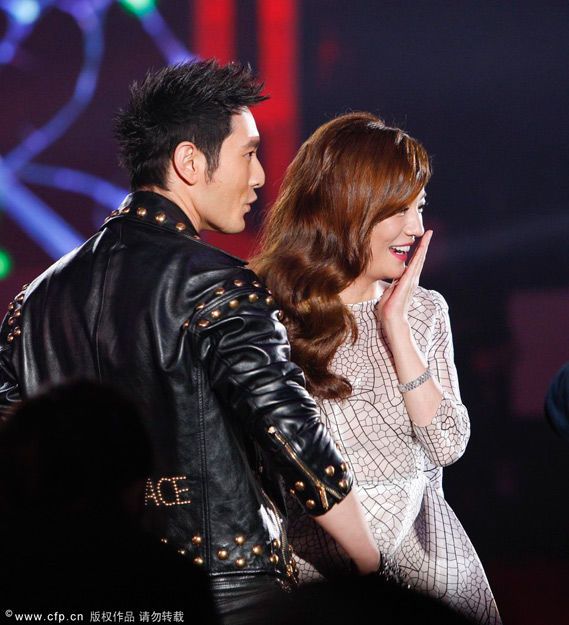
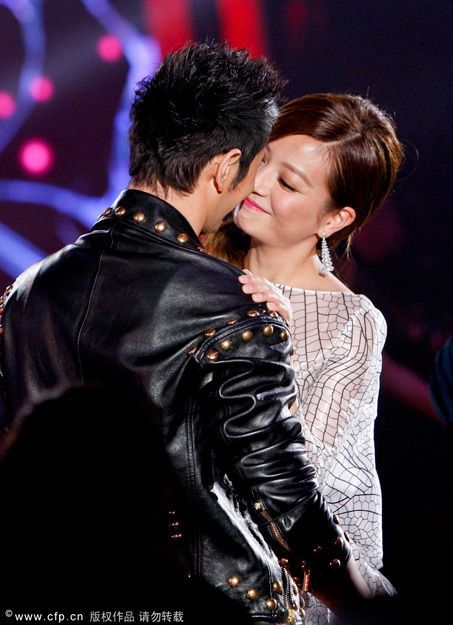

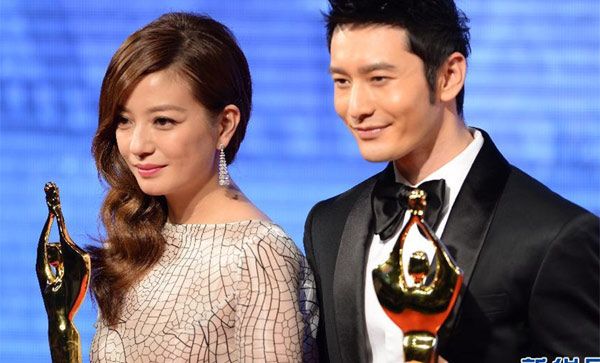
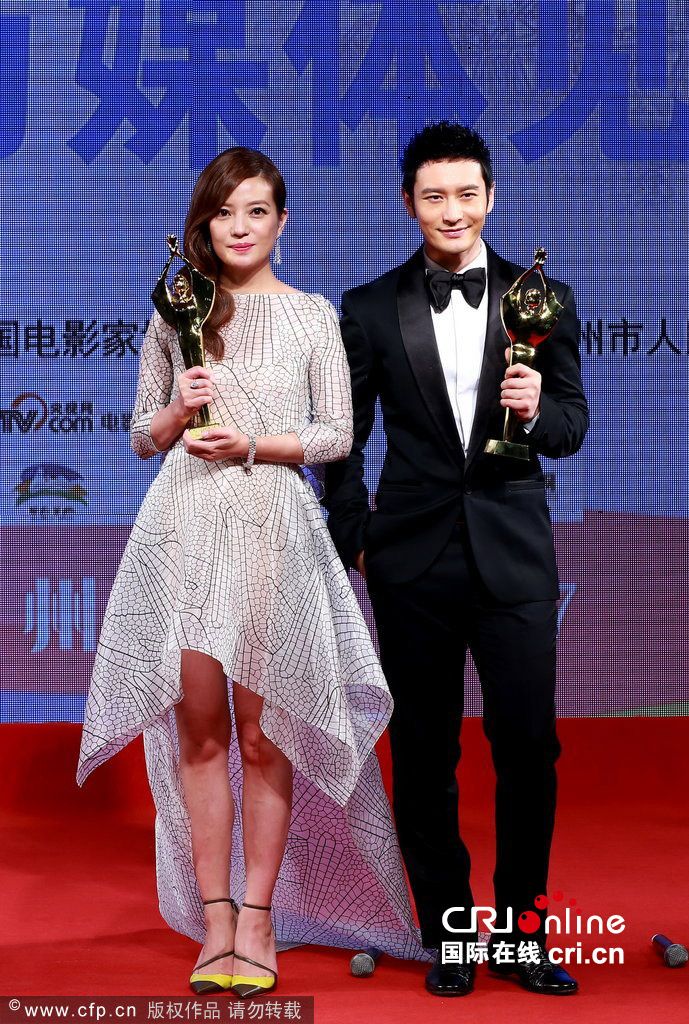
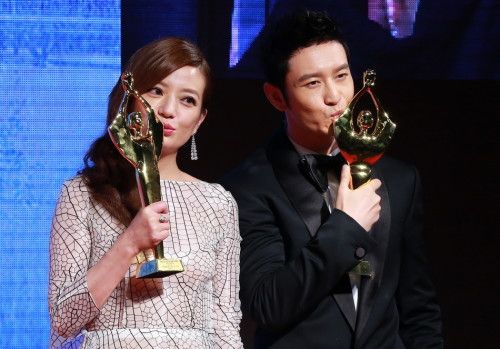
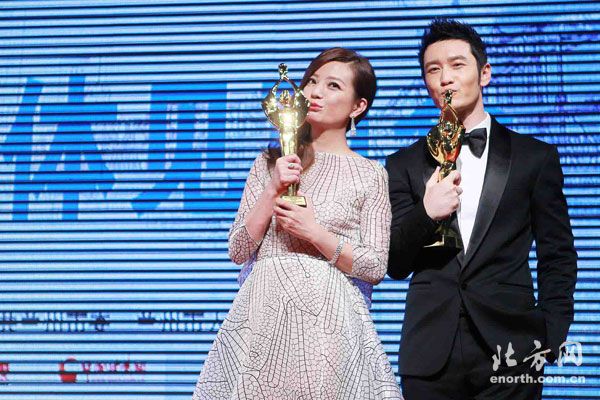
OMG! They would actually make a CUTE COUPLE!!!!!!!!
Kyaaaaa! My two most favorite chinese actor & actress!!!! *swoon & faint!*
Mine too…awwww so sweet n romantic….btw, does anyone know where I can watch this?
https://www.youtube.com/watch?v=ZzWpfv2yCC4
Thx for sharing the link….awww it was so cute to see their lil dance n great to c the audience so immersed n dancing along to the choreo n song
I love her dress, her hairdo, her makeup…everything! She looks so perfect that evening! And yes, so envious of their long-time close friendship! I’d love them to romance each other, but somehow this BFF-ship contains even more magic!
Angelababy must be totally fuming! Haha.
Although unfamiliar with C-ent, their relationship from the stills above only reminds me of that of Faye Wong and Nic Tse. Seriously if the lady wasn’t already married, I wouldn’t be surprised the least bit that Huang would propose to her instead of Angelababy.
Always loved them.
aw, their friendship is so sweet.
Zhao Wei’s dress does not work for me, but she is charming as ever. And their two-decade friendship is sweet and really something. Not that there are no guy-girl besties in the world, but it is so rare, especially when both of them have their own partners.
I love the friendship they share with each other now, but I am also curious if at some point, there was romantic feeling involved but they grow to stay beside each other as friends instead. Of course it is their own business, but man, that would be such a bitter-sweet story.
They are so cute together. Hope the news about their collaboration is true!
I really hope they can act in a movie or drama together bc she’s already done 3 movies with her other guy bestie (chen kun) but none with hxm so I pray to the entertainment god to let them have a few future projects together n let then b the otp too plz
Vicky Zhou beat Wong Kar Wai with “So Young”?
I haven’t seen “The Grandmaster” yet, but “So Young” was terrible. It looked pretty, but had no substance, no originality. All clichés, underdeveloped characters all around, scenes that had no purpose except to make things look pretty… It was not well directed at all.
I saw the film in a screening that had a Q&A with Vicky Zhou at the end too, and nothing she said convinced either that she actually knew what she was doing.
Oops, sorry, spelled her name wrong *too early… 6 am where I am*
You say that the main character behaves exactly like those from a lot of dramas, but then you say that it’s different in the sense that she didn’t like the guy at first. In my opinion, if you’re able to see some differences then you can’t really talk about a cliché.
But it’s not just that; for me the character is much more than what could be called the cliché of a girl chasing a guy. She’s someone who seeks validation because her first love abandoned her, and I think that explains why she stops hating this new guy and gets more and more interested the more he rejects her. Later, after they finally got to the point of really loving each other, he also leaves her, and her feelings of abandonment get reinforced, which leads her to have a professionally successful but (ironically just like him) unhappy life.
And for me that is precisely the point of the movie, it’s not so much about the love story itself; it’s about the impossibility to live your life to the fullest if you remain spiritually stuck, either because you yearn for something you no longer have, or because you regret not trying to achieve it.
I think the love interest from college has enough screen time. It’s at least one hour, maybe more. I also think that the supporting female roles are well developed and are not monochromatic or simply stereotypes as you claim they are. Maybe the supporting male ones are not that predominant but with the time constraints that you have in a movie you really can’t have it all. For example I would have liked to see more from the childhood/adolescence love relationship. Even so, I think all of the male and female roles achieve the main purpose of portraying a group of people from the same generation, with different backgrounds, different stories and different personalities, and yet subject to the same sadness, the same life-corrupting illness. In the second part of the movie you can see how they are somehow changed and yet keep exhibiting similar traits to those they have in the first one, which is quite logic since that’s the film’s main theme: the sick grip that “the loss of youth” has on them; almost everybody has simply surrendered and resigned to their fates, getting old but not really growing up.
About the dream sequence: it lasts one minute, that’s not too much. And I don’t think it’s irrelevant. Later, at the middle of the movie, it gets a follow up when the main character “extracts” a love confession (without words) from the college guy. She looks at her feet and she sees the same magical, princess –type shoes from the dream. I think it makes sense, because the film up to this point is basically the recollection of her youthful memories, which are basically all about her desire of “becoming a princess” (when she was a child and when she was at college), forever longing for a “Prince Charming” to make her happy, instead of seeking that happiness first within herself.
Finally, thanks for the link. Now I have read your review, and as you can imagine, I do disagree with the majority of your opinions. Of course, I respect them, and it’s not my intention to convince you to change them. I just happen to have my own, and since they radically differ from yours, I just thought it was appropriate for me to make that statement.
I disagree. I watched the movie and I think it’s great. I don’t see the underdevelopment or the clichés that you mention.
The substance of the film and the director’s intention are pretty clear to me: it’s a reflection on the unhappiness and despair that lingers over many young adults once they confront themselves and realize how different they turned out to be from what they initially expected, how little courage they had at the moment of discerning and pursuing what was best for them, and worst of all, how incapable they have become at finding joy in their present lives, stuck with the memories of the past.
Maybe there’s too many supporting characters and the follow up on some of them takes away some screen time from the main ones, but I think that was justified considering that the movie is about all of them as a generation, a whole group of people growing up in China, each one from a different social context.
And I really liked that there’s no happy ending, no “romantic love will make it all alright”. Instead there’s a hint of hope for the main character; it seems she has understood that all she needed to do was to accept herself, love herself, and move on with her life.
No clichés? The heroine herself is a version of the girl from Playful Kiss (remade in multiple countries), which is a type of character you get in dramas all the time. Girl who pursues guy (who has zero interest in her) like she’s piece of gum stuck to his shoe. The only difference is that she couldn’t stand him at first, although I’m still not sure why she changed her mind.
She’s the only character that has any sort of development, her first guy gets little screen time and then disappears for a good chunk of time, the other guy doesn’t appear until 2/3 into the film, only being talked about before. We learn amazingly little about either of them, as well as about the heroine’s roommates, who were reduced to one or two characteristics (e.g. the girl who is too beautiful, the girl who doesn’t want anyone to sit on her bed).
Maybe if Zhao had skipped the dream sequence opening the film that had no relevance for the rest of the film (well, it looked as pretty as the rest), she could have used that time to develop some of the characters and their motivations.
If you are interested, you can read my review (though feel free to disagree):
https://alualuna.wordpress.com/2013/12/12/off-review-so-young/
I hear the book is good though.
Sorry, I just posted my last reply above yours and not below. Anyway I think it’s obvious it was meant for your latest comment and not for the previous one.